Photographs: Reuters B Raman
Partisan political games seem to have boomeranged on Indian investigative agencies, observes B Raman
The investigation into the terror strike that rocked the Samjauta Express to Pakistan on February 18, 2007 is becoming messier, further discrediting Indian investigative agencies.
Of the 68 passengers killed in the terror strike, 43 were Pakistanis who were returning home after visiting India.
Initial investigations pointed the needle of suspicion at Jihadi terrorists belonging to Pakistani organisations such as the Lashkar-e-Tayiba. A finding by the United States department of treasury, which is responsible for tracking the flow of funds to terror activities, also blamed the LeT and the Al Qaeda.
...
Samjhauta Express blast carried out by right-wing outfits?
Image: A candle-light demonstration for the victims of the Samjhauta Express blastPhotographs: Amit Gupta/Reuters
Subsequently, Indian agencies claimed that further investigations showed that the act of terrorism on board the train was actually the work of some Hindu extremists, who were associated with right-wing organisations in the past.
They went to town with a confession reportedly made before a magistrate by Swami Aseemanand, who allegedly had links to some right-wing elements in the past.
In his confessional statement, which mysteriously found its way into the hands of a journalist of Tehelka magazine, he had admitted to his role not only in the Samjhauta Express blast but also in the terror attacks at Ajmer, Malegaon and the Mecca mosque at Hyderabad.
Aseemanand retracted his confession
Image: A file photo of a family inside the Samjhauta Express trainPhotographs: Adnan Abidi/Reuters
While his confessional statement, which was prematurely leaked by Tehelka, was under verification, Swami Aseemanand reportedly retracted it.
He is also reported to have told the court that he was threatened and pressurised to become a government witness in this case.
The retraction of his confession came a day before the meeting between Prime Minister Manmohan Singh and his Pakistani counterpart Yusuf Raza Gilani at Mohali during the India-Pakistan World Cup cricket semi-final match.
Aseemanand can still be prosecuted
Image: Swami AseemanandIt coincided with the meeting of the home/interior secretaries of India and Pakistan in Delhi on March 28 and March 29.
During the talks, the Indian delegation reportedly shared with the Pakistani delegation some details of the confessional statement.
Aseemanand's denial of the confession does not absolve him of his responsibility in the train blast. He can even now be successfully prosecuted provided other suspects who were arrested during the investigation -- either on the basis of his confession or through other independent evidence -- stick to their respective statements and testify against him in the court.
The entire case may fail
Image: Onlookers stand near the burnt carriage of the Samjhauta Express train after the blastPhotographs: Desmond Boylan/Reuters
If they do not do so, the entire case regarding the involvement of some right-wing ultras in the train blast could fail.
The leakage of the details of the confessional statement to the media before the statement had been verified was apparently an attempt by the government to use its investigative agencies to score political gains against the Hindutva organisations. This partisan political game seems to have boomeranged as a result of the retraction of the confession.
Irrespective of whether Jihadi terrorists or Hindu elements were involved, the forensic evidence collected -- such as about the nature of the improvised explosive devices used -- would be the same.
Who are the real perpetrators?
Image: A boy participates in a demonstration to condemn the Samjhauta Express blastPhotographs: Parth Sanyal/Reuters
On the basis of the same forensic evidence, Jihadi terrorists were initially blamed. After the confessional statement, right-wing forces were blamed.
With the confessional statement most probably losing its credibility because of the retraction, who are the real perpetrators of the crime?
The investigative agencies could find themselves in a very embarrassing situation if they have to answer this question. This is what happens when investigative agencies deviate from the path of professionalism and let themselves be used in partisan political games.

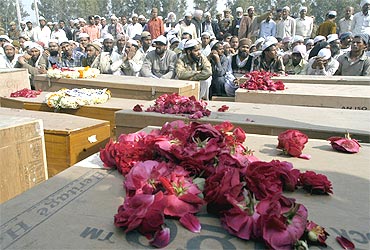
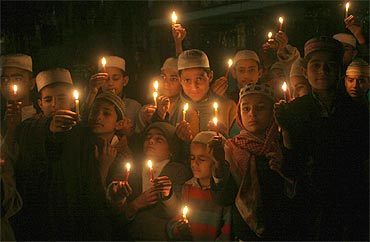
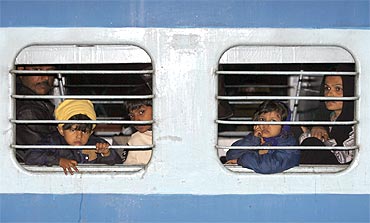
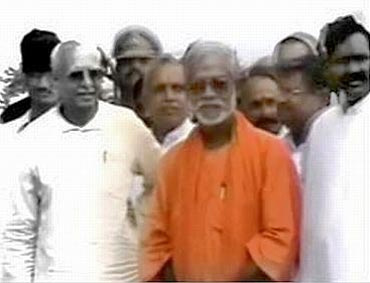
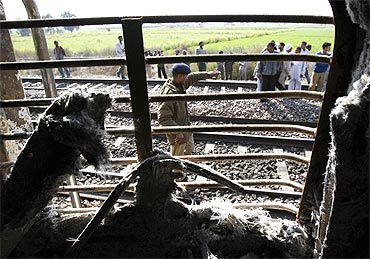
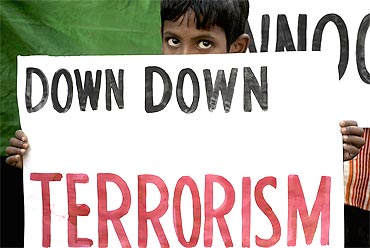
article